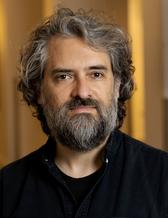- Home
- News and events
- Find news
- Giovanni Volpe awarded the Faculty of Science’s 2023 Research Award
Giovanni Volpe awarded the Faculty of Science’s 2023 Research Award
The Faculty of Science’s 2023 Research Award is being given to Giovanni Volpe at the Department of Physics. He is receiving the award for using methods from physics like microskopical spectroscopy and machine learning to look into complex and biological systems.

How did you react on receiving this award?
”I was pleasantly surprised and felt genuinely appreciated. It's rewarding to see our efforts acknowledged.”
Tell us a bit more about your research?
”In our research group, the Soft Matter Lab, our primary focus is on active matter and critical phenomena. We study the dynamics, interactions, and emergent behaviors of tiny active particles. A significant component of our research involves using optical manipulation, where light becomes our tool to influence these small particles. Our approach is distinctly interdisciplinary. While rooted in physics, we often intersect with the world of neuroscience, aiming to decode the vast complexities of neural networks. The integration of deep learning and AI into our work is especially pivotal. Merging these disciplines allows us to explore the evolving nature of systems and understand how they adapt. Standing at the crossroads of these varied scientific fields amplifies the potential and reach of our research.”
What is the next step in your research?
”Our immediate focus is on pushing the frontiers of active matter, critical phenomena, and optical tweezers. These domains offer a plethora of uncharted territories and we're fully geared up to chart them. AI's role in our pursuit continues to grow. We're channeling its capabilities to craft innovative tools for neurosciences and medicine, ensuring that the benefits of our research reverberate beyond the confines of our lab. On the educational front, we're soon launching the "Deep Learning Crash Course." This book is aimed at making the complex world of AI more accessible to all. Alongside, we've been working on tools that cater to both academia and industry:
- DeepTrack is a software designed to facilitate optical tracking using deep learning. It streamlines complex imaging processes, making it a breeze to track and analyze micro and nano-sized particles.
- Braph stands as a testament to our commitment to neurosciences. It's a comprehensive software suite tailored for brain connectivity analysis. Through its intuitive interface, researchers can delve into graph theory-based analyses, exploring neural interconnections in depth.”
What impact can your research have in the future?
”Our research promises to revolutionize various sectors, starting with technology. From tech advancements to healthcare innovations, our research aims to craft a more efficient and informed future. By merging physical sciences with AI, tools like DeepTrack are poised to redefine diagnostics, automation, and intricate data analysis. In the realm of active matter and optical tweezers, we anticipate breakthroughs in targeted drug delivery and precision surgeries. Dive into neurosciences, and our tools such as Braph offer deeper insights into brain connectivity, heralding innovative diagnostic tools and treatments for neurological conditions. Additionally, our dedication to education is clear, as showcased by resources like the "Deep Learning Crash Course", aiming to make AI and deep learning knowledge accessible to all.”
Anything else you might want to add?
”Beyond academia, I've always believed in translating research into real-world applications. This ethos led to the birth of two startups – Lucero BIO AB and IFLAI AB. Lucero BIO AB endeavors to bridge the gap between innovative optical tools and biotechnology, aiming to foster new solutions in life sciences. Meanwhile, IFLAI AB is rooted in the promise of artificial intelligence and its vast potential across various industries. Collaborations, be it in academia or the business world, are the catalysts for groundbreaking innovations, and I'm excited for the journey ahead with both these ventures.”
Award motivation
Giovanni Volpe is a world-leading researcher in the fields of microscopy and spectroscopy of living systems, artificial living matter and in machine-learning algorithms to analyse complex and biological systems. It’s in the latter area Giovanni realized an enormous untapped potential of these methods to be applied for the characterization of the broadest scope of living biological systems studied across the Faculty of Science and other faculties at the University of Gothenburg.
He is also a highly regarded mentor and educator of the next generation of researchers, is active in shaping the policies of the graduate education at large and is active in communicating his research to the public as well as spinning it off commercially.
He inspires the people around him, always striving to lift his research environment to the highest international level.
About the Research Award
The award recognises development of a research specialisation that significantly contributes to novelty in the faculty’s research. The award recipient receives a diploma and a research grant of SEK 250,000. The award ceremony will be held on 19 October.